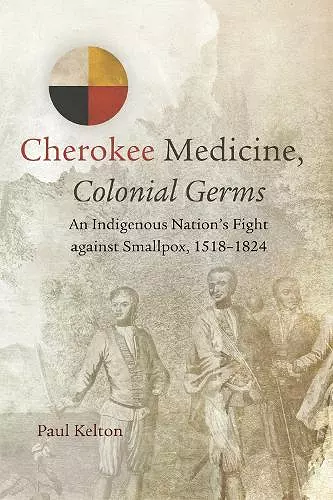Cherokee Medicine, Colonial Germs
An Indigenous Nation's Fight against Smallpox, 1518-1824
Format:Paperback
Publisher:University of Oklahoma Press
Published:30th May '18
Currently unavailable, and unfortunately no date known when it will be back

How smallpox, or Variola, caused widespread devastation during the European colonization of the Americas is a well-known story. But as historian Paul Kelton informs us, that's precisely what it is: a convenient story. In Cherokee Medicine, Colonial Germs Kelton challenges the ""virgin soil thesis,"" or the widely held belief that Natives' lack of immunities and their inept healers were responsible for their downfall. Eschewing the metaphors and hyperbole routinely associated with the impact of smallpox, he firmly shifts the focus to the root cause of indigenous suffering and depopulation - colonialism writ large; not disease.
Kelton's account begins with the long, false dawn between 1518 and the mid-seventeenth century, when sporadic encounters with Europeans did little to bring Cherokees into the wider circulation of guns, goods, and germs that had begun to transform Native worlds. By the 1690s English-inspired slave raids had triggered a massive smallpox epidemic that struck the Cherokees for the first time. Through the eighteenth century, Cherokees repeatedly responded to real and threatened epidemics - and they did so effectively by drawing on their own medicine. Yet they also faced terribly destructive physical violence from the British during the Anglo-Cherokee War (1759-1761) and from American militias during the Revolutionary War. Having suffered much more from the scourge of war than from smallpox, the Cherokee population rebounded during the nineteenth century and, without abandoning Native medical practices and beliefs, Cherokees took part in the nascent global effort to eradicate Variola by embracing vaccination.
A far more complex and nuanced history of Variola among American Indians emerges from these pages, one that privileges the lived experiences of the Cherokees over the story of their supposedly ill-equipped immune systems and counterproductive responses. Cherokee Medicine, Colonial Germs shows us how Europeans and their American descendants have obscured the past with the stories they left behind, and how these stories have perpetuated a simplistic understanding of colonialism.
Historians have long written that American Indian populations were helpless before the onslaught of European microbes. In this definitive analysis of early Cherokee history, Paul Kelton lays the simplistic virgin soil theory to rest and shows that epidemics of smallpox and other pathogens were not the inevitable result of European arrival. Instead, they took root amid the devastation unleashed by European colonization. The Cherokees, too, were not hapless victims, but exhibited resilience and creativity by integrating new diseases into their cosmology and medical practices to reduce exposure and control outbreaks. Kelton's meticulously researched account rewrites an important part of the history of early America."" - David S. Jones, author of Rationalizing Epidemics: Meanings and Uses of American Indian Mortality since 1600
""This book joins distinguished scholarship on early American Indian history that is centered on the Indian experience and revises historians' knowledge of a time and place they thought they knew well."" - H-Net Reviews in the Humanities & Social Sciences
""Cherokee Medicine…will lead scholars to reexamine how they understand and write about epidemic disease."" - Journal of Southern History
""He puts colonists' often vague and unsubstantiated references to apocalyptic sickness under a microscope….Kelton demonstrates how close, rigorous analysis proves that Native responses to smallpox were varied, innovative (including the use of quarantine and vaccination), and often effective….Excellent."" - Choice
""Of the many new insights that Kelton contributes, none is more important than the Cherokee response to smallpox, which undermines the narrative of Native peoples as passive victims….Kelton's work is a much-needed antidote to prevailing 'narratives of disease'…."" - Ethnohistory
ISBN: 9780806160986
Dimensions: 229mm x 152mm x 18mm
Weight: 408g
296 pages